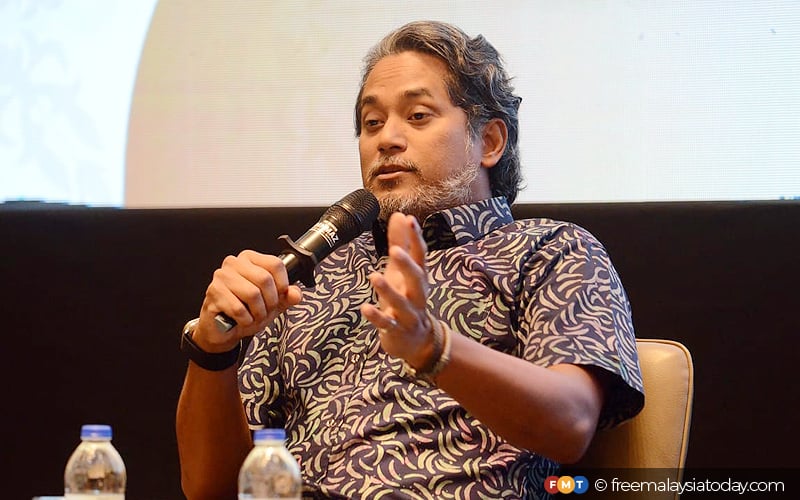FMT:
Wages not the only reason behind brain drain, says Khairy
Ex-health minister Khairy Jamaluddin says it is also because some Malaysians feel like ‘second-class citizens’, particularly the non-Bumiputeras.

Khairy Jamaluddin said it may take 50 years for Malaysia to compete with Singapore in terms of salaries offered.
PETALING JAYA: Khairy Jamaluddin claims that the brain drain Malaysia is facing is not only due to higher salaries being offered abroad as there are other factors that may be keeping them from returning.
He said there are other factors at play, such as how some Malaysians wish to return to be entrepreneurs but the local ecosystem may not be welcoming to them.
“They may come back but then must face a multitude of problems, (such as) bureaucracy in kickstarting their business, and the market being not sophisticated enough to support their products.
“So, to say that this issue is only a matter of wages, is not enough. We need to really see if Malaysia has become a livable place that is also facilitative of their efforts to return,” he said in the latest episode of the Keluar Sekejap podcast today.
He added that it would be difficult for Malaysia to compete with Singapore in terms of salaries offered, saying that this would most likely only be achievable in about 50 years when Malaysia’s productivity increases, but impossible in the next 10 years.
The former health minister also said another reason for the brain drain is because some Malaysians feel like “second-class citizens”, particularly the non-Bumiputeras.
“They feel like they are not being given fair opportunities. They (Malaysians) win scholarships from Singapore and get placements in Singaporean universities and if they return, they’d still be treated like second-class citizens due to pro-Bumiputera policies.
“I think that may be an oversimplification, but there is some truth in it. We have to admit it,” he said.
His co-host, Shahril Hamdan, agreed but said that Malaysians would still be treated as second class citizens in Singapore and not be eligible for schemes offered to locals.
The former Umno information chief said the real issue is how Malaysia could ensure the Bumiputera agenda could be made a “national agenda” that is seen to be fair and acceptable for the non-Bumiputeras.
He said, for example, it would be difficult to defend policies that benefit Bumiputeras who are already wealthy.
On Monday, Dewan Rakyat Speaker Johari Abdul urged Malaysian students in China to return home upon graduation to help lead national development.
In his public lecture to Malaysian students at Tsinghua University in Beijing, he told them to learn as much as possible from China and return to contribute to their homeland.
PETALING JAYA: Khairy Jamaluddin claims that the brain drain Malaysia is facing is not only due to higher salaries being offered abroad as there are other factors that may be keeping them from returning.
He said there are other factors at play, such as how some Malaysians wish to return to be entrepreneurs but the local ecosystem may not be welcoming to them.
“They may come back but then must face a multitude of problems, (such as) bureaucracy in kickstarting their business, and the market being not sophisticated enough to support their products.
“So, to say that this issue is only a matter of wages, is not enough. We need to really see if Malaysia has become a livable place that is also facilitative of their efforts to return,” he said in the latest episode of the Keluar Sekejap podcast today.
He added that it would be difficult for Malaysia to compete with Singapore in terms of salaries offered, saying that this would most likely only be achievable in about 50 years when Malaysia’s productivity increases, but impossible in the next 10 years.
The former health minister also said another reason for the brain drain is because some Malaysians feel like “second-class citizens”, particularly the non-Bumiputeras.
“They feel like they are not being given fair opportunities. They (Malaysians) win scholarships from Singapore and get placements in Singaporean universities and if they return, they’d still be treated like second-class citizens due to pro-Bumiputera policies.
“I think that may be an oversimplification, but there is some truth in it. We have to admit it,” he said.
His co-host, Shahril Hamdan, agreed but said that Malaysians would still be treated as second class citizens in Singapore and not be eligible for schemes offered to locals.
The former Umno information chief said the real issue is how Malaysia could ensure the Bumiputera agenda could be made a “national agenda” that is seen to be fair and acceptable for the non-Bumiputeras.
He said, for example, it would be difficult to defend policies that benefit Bumiputeras who are already wealthy.
On Monday, Dewan Rakyat Speaker Johari Abdul urged Malaysian students in China to return home upon graduation to help lead national development.
In his public lecture to Malaysian students at Tsinghua University in Beijing, he told them to learn as much as possible from China and return to contribute to their homeland.
Wakakaka…
ReplyDeleteCan the ketuanan agenda be abolished? (Note not revamping into any superficial form!)
Expecting the products of giatunas to reinvent bolihland?
Yaloh, more bolih than the real bolih that the competitive world is seeking for.
50 yrs? Tan kuku lag even if the process of giatunas stops NOW!